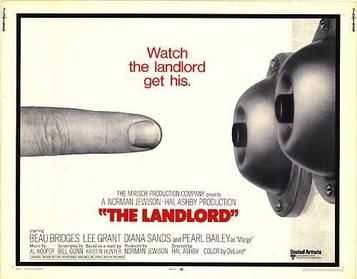AFI and The Skirball Center combined to host a series called Cinema Legacy, in which they invite renowned filmmakers to sit in on a screening and Q & A for a movie that has influenced them as a filmmaker. John Singleton was last night's guest and he screened The Landlord, which I had been trying to find for years.

It was the first film directed by Hal Ashby, a seriously slept on Hollywood legend who went on to direct some of the most critically acclaimed films of the 70s (including The Last Detail, Being There and one of my all-time favs, Shampoo). It deals with Elgar, a spoiled 29-year-old rich kid (Beau Bridges) who decides to buy a beat up tenement in Park Slope, Brooklyn. His plans are to kick out the poor black residents and turn the place into a big old bachelor pad. But he is affected by the various residents there and falls for both the troubled but soulful Fanny (played by the sexy, late, great Diana Sands) and the mixed go-go dancer Lanie (the unbelievably beautiful Marki Bey), in addition to falling out with his snobby but liberal family, who are confused by his increasing empathy towards Negroes.
I don't even know where to start. It is clearly a film made by an editor (Ashby was one of the best in Hollywood before getting this break through his director Norman Jewison.) as it is full of Godard-like jump cuts and abstract images. Characters talk to the screen at times and several montages, as Singleton pointed out, are reminiscent of Do The Right Thing. The score, by Al Kooper (just after his ouster from Blood, Sweat & Tears) with help from The Staple Singers is stunning; it has reintroduced the option of finding a talented but versatile popular artist to score certain films of mine. The cinematography by Gordon Willis (prior to his similarly themed work in the Godfather films and Annie Hall) is luminous. (The no-nudity sex scene between Bridges and Bey and the scene where where Bridges and Bey walk back to her place after meeting are particularly beautiful.) Despite the film's occasional revelations that it was hella low budget (there are actually two scenes where one can see boom mics), it is as an honest a treatment of race relations -- as well as a phenomenal document of the general sociological chaos of the early 1970s -- as I have ever seen on film.
I got a chance to holla at John Singleton real quick after the Q&A, which was moderated by Ayuko Babu, founder of the Pan African Film Festival (which I recently volunteered for). People were all around, so I didn't get to say much, except to slip him my card and request to interview him for Intrepid Media. We'll see what happens. But it was an honor to meet him and a lot of the comments he made about remaining true to yourself as an artist really hit home. On that note, I wanted to thank those who reached out to me after my last entry. I'm not going anywhere. I was just sick and had too much time to think.
We're moving into pre-production on the Parkside Boulevard short. So you'll be getting the blow by blow on that soon. And the work on Somewhere Between Here and There is coming along nicely. I actually plan to spend the rest of the day typing up my changes for Chapter 5 and continuing my rewrite for Chapter 4. Wifey's shooting a pilot for BET as we speak. So life is well.